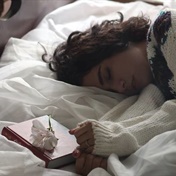- Ever abruptly woken up by a falling or slipping sensation?
- Even though this phenomenon is harmless and common, it can be triggered by certain factors.
- Experts are not sure about the exact cause, but there are some theories.
Ever drifted off to sleep after a long day, only to suddenly feel like you are falling, stumbling, floating, or slipping? Your body jerks, abruptly waking you up. Luckily, it's not a real fall, but you can't help wondering what causes this sensation.
Hypnic jerks
According to sleep disorders specialist Dr Reena Mehra, these sensations are caused by involuntary muscle movements and are called sleep myoclonus or hypnic myoclonus.
This sensation occurs in about 70% of people. According to the National Sleep Foundation, experts are still unsure about the cause, but there are some hypotheses.
Some believe that as your breathing and heart rate slow down, and your body temperature drops, your muscle tone starts to shift, causing full-body twitches. Another theory is that your brain starts to misinterpret the gradual relaxation of the muscles as a sign that you might actually be stumbling. As a result, your muscles tense up as a protective mechanism, and you are jolted awake.
Another theory suggests that your brain still interprets your body as awake, but your muscles are already fully relaxed - and as a precaution, your brain then signals a "wake-up call" to your muscles, causing your whole body to jerk.
Should I worry about these sensations?
Although these "falling spells" may feel strange, there is nothing to worry about. Dr Mehra, however, suggests that there are some triggers that can cause these disturbances to happen more regularly. These include:
- Stress
- Stimulants such as caffeine and alcohol
- An overall lack of sleep
If you feel like these sensations are disturbing your sleep quality, you can try to identify the triggers that are causing your sleep disturbances.
Dr Mehra states that if these sensations happen very frequently, myoclonus could be a result of a more serious sleep disorder, which should be discussed with your doctor.
Quick tips for quality sleep
Regular lack of sleep can severely impact your quality of life and your overall health. If you haven't been sleeping well lately, here are some practical tips:
- Limit screen time and exposure to blue light at least an hour before bedtime.
- Practice good "sleep hygiene". Check the air quality and temperature in your room to ensure that you are comfortable. If you are prone to sinusitis or seasonal allergies, limit dust and pet dander in your room.
- Take stock of your pillow and mattress to ensure that your spine and neck are properly supported.
- Limit caffeine and alcohol, especially late in the day.
- Make time for meditation to control any feelings of anxiety.
- Talk to your doctor about treatment if nothing else helps.
- Ensure that any light from outside is blocked out.
READ | How to sleep better while working from home
READ | 10 things you should never say to someone who suffers from insomnia
READ | Streetlights could be harming your teen's sleep and mental health
Image credit: Pexels




 Publications
Publications
 Partners
Partners
















